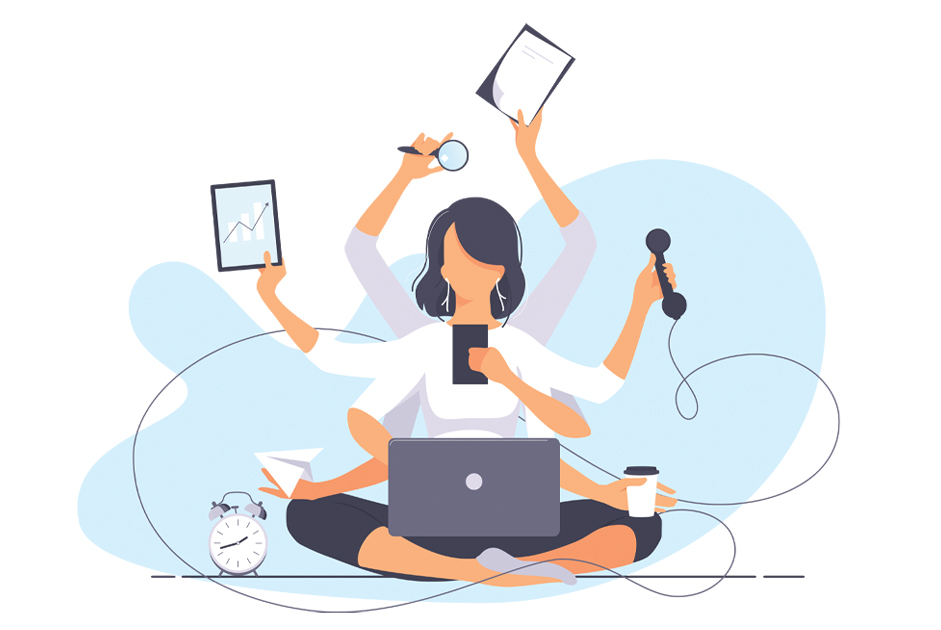- Do you check your email or browse online while you’re talking to someone on the phone?
- Do you respond to text messages while you’re in a meeting or watching TV with your family?
- If you’re a student, do you use social media while you’re studying?
All of these are examples of multitasking – attending to multiple tasks at the same time to quickly accomplish as much as possible. When we have a long “to-do” list or feel the pinch of a time crunch, multitasking makes us feel like we’re making the best possible use of our time and getting more done.
There’s just one problem with multitasking: it doesn’t work.
Does that surprise you? The truth is that multitasking doesn’t work because it cannot work. According to neuroscience researchers, the human brain lacks the architecture to perform two or more tasks simultaneously. In other words, our brains are only capable of focusing on one thing at a time. When people think they are multitasking, what they are actually doing is task switching. Task switching means rapidly turning your attention from one thing to another again and again. Multitaskers are simply just good at task switching. And the problem with task switching is that it is terribly inefficient. While some people insist that multitasking is a time saver, it’s really not; it actually adds time.
Multitasking slows us down because every time the brain leaves one task unfinished to move on to another, it must reorient to the new task. It must first bring the new task to mind and then direct attention to the information that is relevant to perform it. When it leaves this task unfinished and moves on to yet another one, the brain has to do all that reorienting again. What’s worse, according to the neuroscience experts at the Dana Foundation, is when we rapidly task switch, “valuable information, without fail, falls through the cracks.” Thus, not only is multitasking slower than was once believed; it inevitably leads to mistakes. So, now we know the truth: multitasking involves “task switch costs.” And, that’s not all! In addition, the fast-paced attention switching of multitasking also depletes the brain’s supply of glucose. Glucose is the fuel that enables the brain’s neurons to communicate with one another. Thus, multitasking can lead to brain fatigue which makes it harder to stay focused, harder to be productive and makes us more forgetful.
The real truth about multitasking, according to the Dana Foundation, is that “…studies consistently show that human beings are terrible multitaskers.” Science is now pointing us all to what does actually work, which is monotasking. The reason monotasking is superior to multitasking is because, when we switch back and forth from task to task, we give up the efficiency that goes with staying focused on just one task.
Whether we call it monotasking, single tasking or unit tasking, it is now clear that our brains are “wired” to focus on just one task at a time. Single tasking is better than rapid task switching no matter what we’re trying to accomplish. It enhances our performance whether we are working in an office, shopping online or cleaning up at home, and it keeps us safer when we’re navigating bumper-to-bumper traffic on the freeway. Many experts now affirm that we perform best when we’re doing one thing at a time. One sociologist said, “We can move from the idea that multitasking and busyness is a sign of our productivity…to the truth, which is that we’re actually more productive when we single task. Our brains are not computers. They were not designed to run multiple apps in any one given time.”
It’s been said that there is an exception to everything, and this is true of multitasking. While 98% of human beings cannot multitask, about 2% of people are “supertaskers” who actually can. Their brain structure is different from the brain structure the rest of us have. If you’re one of the rare supertaskers, enjoy your superpower! Otherwise, Psychology Today writer Garth Sundem advises, “…if you’re not a supertasker, the overwhelming message of science is this: just give it up already! By multitasking, you do everything less well. Instead, if you want to get the most done right, design your life to monotask. Your brain will thank you for it.”1
While some people insist that multitasking is a time saver, it’s really not; it actually adds time.
When people think they are multitasking, what they are actually doing is task switching.
—————–
1. Garth Sundem, “This Is Your Brain on Multitasking,” February 24, 2012. Psychology Today.



















